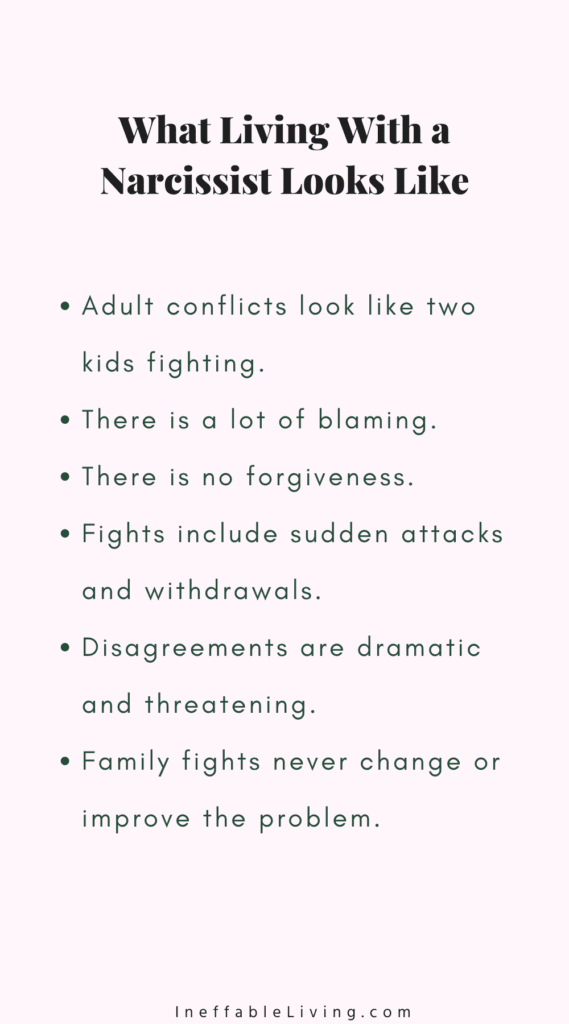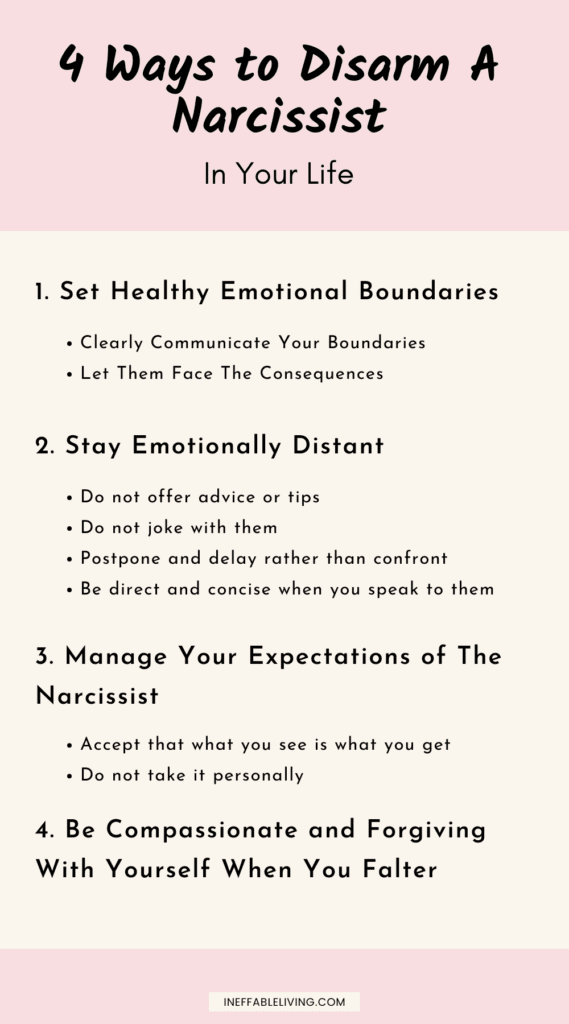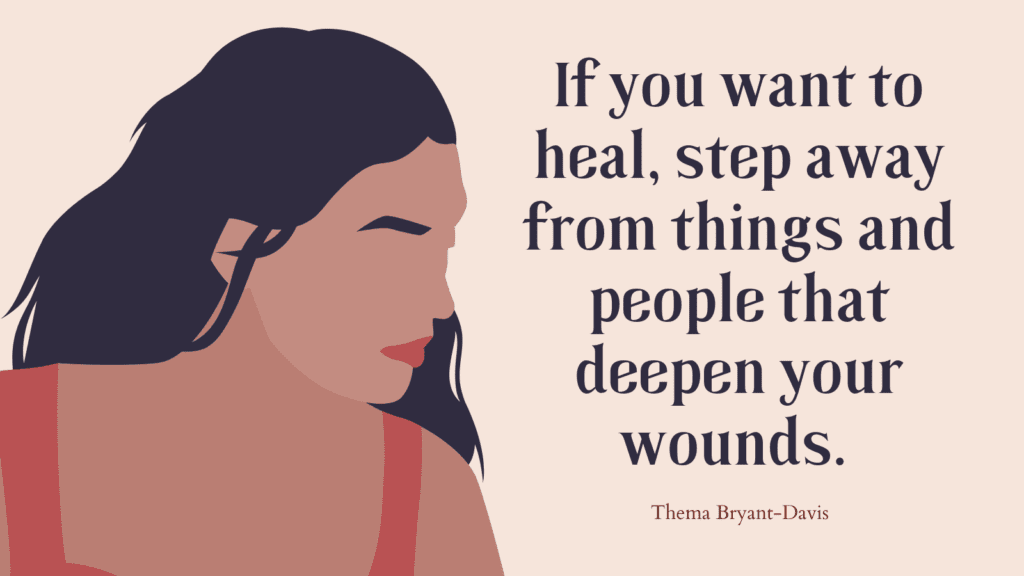This guide will help you learn how to get revenge on a narcissist and protect yourself from narcissistic abuse when you have to deal with narcissist at home or in the workplace.
We encounter a lot of people in our lives that are incredibly self-centered, egocentric, grandiose, pretentious, thoughtless, and inconsiderate.
All of these describe narcissistic traits and people who only care about themselves.
Although it’s best to avoid these people, oftentimes, we find ourselves in situations where we have to deal with narcissists.
These narcissists could be a family member we have to live with, an ex with who we are co-parenting, a coworker, etc.
The best revenge you can get is to protect yourself from narcissistic abuse and live your best life!
First Understand The Narcissist: 13 Traits of a Narcissist
According to the Diagnostic and Statistical Manual DSM-5 that therapists use as a guide, the person needs to have only 55 percent of the following characteristics to be considered narcissistic. (source)
#1. They Act Superior and Entitled
In the world of the narcissists there is a hierarchy for people, with the narcissists at the top.
The narcissists consider themselves to be the best, the most right, and the most competent. They believe that they own everything and control everyone.
They can also get that superior feeling by being the worst, the most ill, upset, or injured. This makes them feel entitled to receive soothing concern, and even the right to hurt you or demand apologies.
#2. They Have a High Need for Attention and Validation
Narcissists need constant attentions and validation from others to shore up their egos.
However, no matter how much you tell narcissists you love them, or approve of them, they never feel that it’s enough – deep down they don’t believe anyone can ever love them.
Despite grandiose bragging, narcissists are very insecure and afraid they’re not going to measure up.
#3. They Believe Everything Should Be Perfect
Narcissists believe they should be perfect, you should be perfect, and events should happen exactly as they envision them.
Their excruciating demands lead the narcissist to complain and be constantly dissatisfied.
#4. They Have a High Need for Control
The narcissists need for everything to be perfect along with their sense of entitlement, makes it seem logical to them that they should be in control—of everything.
Narcissists always have a story line in mind about how their life and each “character” in their life should be. So When you don’t behave as expected, or when things don’t go as they envisioned, they become quite upset and unsatisfied.
Related: Healing From a Narcissistic Parent: 7 Ways to Heal After Surviving a Narcissistic Parent
#5. They Don’t Take Responsibility For Themselves or Their Lives
Despite their need to be in control, narcissists never want to be responsible for the results, especially when things don’t go exactly their way or when they feel criticized and less than perfect.
To maintain their façade of perfection, they would place all the blame and responsibility on you – it has to be someone else’s fault. Other times, the blame is generalized (police, bosses, teachers, politicians, laws, and so on.)
#6. They Lack Understanding of Boundaries
Narcissists are a lot like a child who believes that everything belongs to them, everyone thinks, feels and wants the same things they do.
Narcissists can’t see where they end and you begin. They are shocked and feel insulted when they’re told no and would go to great lengths to get what they want through persistence, cajoling, demanding, etc.
Related: Recovering From a Narcissistic Relationship: 21 Steps to Heal After a Narcissistic Relationship
#7. They Lack Empathy
Lack of empathy is one of the main characteristics of narcissism.
Narcissists are unable to understand what other people are feeling and would expect others to think and feel the same as they do.
They rarely are apologetic or feel remorseful or guilty.
However, narcissists are highly attuned to perceived threats and rejection from others and frequently misread subtle facial expressions and interpret them as negative.
Their lack of ability to correctly read body language and facial expressions make narcissists deficiently empathetic to your feelings and lead them to misinterpret sarcasm or joking as a personal attack.
Narcissists also lack an understanding about the nature of feelings. They believe that their feelings are caused by someone or something outside of themselves – not by their own thoughts, and interpretations.
Related: 5 Traits That Make Empaths Perfect Targets For A Narcissist
#8. They’re Unable to Be Truly Intimate
Their lack of empathy and their constant need for self-protection, makes narcissists emotionally blind and alone.
They can’t truly love or connect emotionally with other people.
This also makes them emotionally needy. While they can’t respond to your pain or fear or even your need for care and sympathy, they desperately want others to feel their pain, to sympathize with them.
Related: Living With a Narcissistic Parent: How to Cope With Your Narcissistic Parent?
#9. They Think Emotionally
Your logical explanation of how hurtful the narcissists’ behaviors are to you won’t make sense to them. They are only able to be aware of their own thoughts and feelings.
Even when they say they understand, they really don’t.
As a result, narcissists make most of their decisions based on how they feel about something – not on whether it is a good choice to make for the family or for the budget.
#10. They Spilt Everything Into Either Good or Bad
In the narcissist world everything is split into good and bad parts.
Narcissists would blame any negative thoughts or behaviors on you or others, while taking credit for everything that is positive.
They also tend to remember things as either completely wonderful or completely horrible – they aren’t able to remember both the positive and the negative in a situation.
#11. Their Fear Motivates and Energizes Their Lives
Fear is the main emotions that motivates and energizes the narcissist’s life. Most of this fear is deeply buried and repressed.
Narcissists are afraid of being rejected, ridiculed, or just plain wrong. They might also fear losing all their money, being seen as bad, or being abandoned, which makes it difficult for the narcissist to trust other people.
Narcissists fear intimacy or vulnerability because they’re afraid you’ll see their flaws and imperfections and judge or reject them. This is why, the more intimate your relationship becomes, the less he’ll trust you.
Narcissists never seem to develop trust in the love of others, no matter how much reassurance they would get – Their fear of being “found out” and abandoned never seems to dissipate.
#12. They Project Their Anxiety Onto Others
Narcissists have an ongoing anxious feeling that something bad is happening or about to happen.
Some narcissists would hide and repress their anxiety, but others would constantly talk about the doom that is going to happen.
Whether they choose to repress it or openly talk about it, most narcissists project their anxiety onto their loved ones.
They might accuse you of being unsupportive, negative, not responding to their needs, or being selfish.
As you start feeling worse and worse, narcissists feel stronger, more superior and less anxious.
Related: Healing From A Codependent Relationship: 4 Ways to Conquer Codependency
#13. They Harbor a Lot of Shame
Narcissists believe they are always right and don’t believe their behaviors affect anyone else, so they don’t really feel guilt.
However, they harbor a lot of shame buried in a deeply repressed part. They believe that there is something deeply and permanently wrong or bad about who they are.
They are constantly on guard to hide insecurities, fears, and rejected traits from everyone, including themselves. This is essential in order to maintain their façade or False Self.
Gaslighting
The term “gaslighting” refers to a form of emotional abuse that came into popular consciousness in a 1938 thriller play, “Gas Light.” The play was then adapted into a movie in 1944.
The movie was about a husband who tried to convince his wife that she was mentally unstable; in order to send her away to a mental asylum take her inheritance.
In “Gaslighting” situations, the goal is to isolate and control the victim’s version of reality.
An example of gaslighting may involve a partner doing something abusive and then blatantly denying that it happened, leaving the victim doubting their perceptions or memories.
Narcissist can use gaslighting to gain authority over a victim’s life.

Types of Narcissism
While most narcissists share the traits presented above, there is more than one type of narcissism.
A narcissist may be a mix of the various types but there is always a dominant type mixed with another.
1. Cerebral Narcissism
A cerebral narcissist is intelligent and uses his intellect (real or perceived) to impress others and get admiration and attention.
But they don’t just use their intellect to impress, they also use it to ruthlessly obliterate anyone standing in their way.
For this type of narcissist, the body and its maintenance can be a burden.
2. Somatic Narcissism
A somatic narcissist uses her body and looks to charm, and seduce – her assets are all external.
The values of this narcissist typically revolve around image, glamour, and beauty.
While it’s usually easy for this narcissist to attract people, the emptiness of their inner world can make it hard for them to sustain a relationship.
Somatic narcissists also have a pronounced intolerance for any imperfection in their partner, which only adds to a growing instability in relationships.
3. Overt Narcissism
Overt narcissists are extrovert in their behavior, loud and working hard to be noticeable.
They have an immense sense of grandiosity and are usually preoccupied about having outstanding success in different areas, like attractiveness, sense of power, ideal love, etc.
They can be very exploitative and manipulative in their quest for success.
4. Covert Narcissism
This is a shy form of narcissism.
Covert narcissists may have fantasies similar to other types of narcissists, but he lacks self-confidence and motivation to pull it off successfully.
They usually play the victim, refusing to take responsibility for themselves, feel worthless and self-loathing, and seek someone to take care of them.
They could be described as parasites, living off other people.
5. Aggressive or Malignant Narcissism
This type of narcissism has displays both symptoms of narcissistic personality disorder and anti-social personality disorder.
They can become violent and psychopathic.
How To Get Revenge On A Narcissist In A Relationship?
#1. Manage Your Expectations
Healthy relationships are based on respect, growth, and shared experiences.
However, when it comes to the narcissistic relationship, those healthy expectations don’t exist.
You maybe have already abandoned these expectations a long time ago. You may have gotten used to living under the narcissist’s regime of control, deceit, rage, neglect, insults, gaslighting, and are now in a place of survival, trying to get through the days.
You should not expect the narcissist to start behaving respectfully and empathically or to change in any way.
Communication might make him change his behavior, but it’s unlikely to change his feelings. You can make a narcissist show up on time, but you can’t make someone feel something he can’t feel.
Related: 4 Keys To Communicate Effectively With Anyone
#2. Think Before Sharing Information
Sharing information with the narcissist can be one of the most challenging aspects of the relationship.
The narcissist is not tuned in to you, and will likely criticize you, minimize you, view your successes as a threat, or humiliate you.
1. Sharing The Good News
If something good happens to you, such as getting a promotion, an award, compliments, etc. don’t share it with your narcissistic partner.
If this sounds extreme, try to reflect on the last three times you told your partner something wonderful that happened to you. How were these pieces of good news received?
If you can’t remember, try sharing good news and consciously observe his reaction.
Typically, narcissists would either ignore you or respond back in an unsupportive way, such as saying “it’s about time,” or, “the only reason the waitress commented on your eyes is because she was hoping for a tip,” or, “why do you always need so much validation from other people?” or simply not responding to the text you sent him.
Chronic criticism will eventually affect your self-esteem and confidence, and can even lead to anxiety and depression.
Instead of sharing your good news with your narcissistic partner first thing, try sharing them with your “good-news people.” The people in your life that support you and believe in you. These may be close friends, safe family members, coworkers, or members of a religious community.
Sharing your news first with them helps you celebrate properly and have a positive experience that you can access in case your partner makes you start doubting yourself.
Not telling your partner anything is also an option, but one that can present some risks.
If the good news has implications for the household or is something that will be mentioned by others, or at some point he will need to know, it might be safer to tell him eventually. But make sure you tell your supportive people first.
2. Sharing The Bad News
Sharing bad news such as a broken window, a late bill, a lost job, etc. can be twice as challenging in a relationship with a narcissist. Not only are you not getting any comforting, you’ll also be blamed for bringing more stress into his life.
Just like with the good news, don’t share it. And if you need to share it, prepare for it.
There are two types of bad news:
1. Bad news that affects only you, such as difficulties in the workplace, an argument with a friend, a loss of a loved one, a health issue in you, etc.
2. Bad news that by extension affects your partner, such as loss of a job, broken dishwasher, your child sent home for behavior issues in school, etc.
Each type of bad news will require different approaches.
Bad news that affects only you
When something bad happened to us, venting and talking about it with our partners help us feel better and get us through it.
However, sharing your bad news with your narcissistic partner you’ll probably get one of these two responses; irritability or indifference.
Just as with the good news, it’s best to find empathic people with whom to share these daily stressors.
Ultimately, realize you are in much of this alone. Find other outlets, such as exercise, meditation, and journaling to help manage your emotions.
Bad news that by extension affects your partner
In this case, although you know your partner will get angry with this kind of “disruptive” bad news, you can’t afford not to share them, or even delaying sharing them.
So prepare yourself.
Try to mindfully take the emotion and the expectation out of it so you are no longer disappointed.
No amount of reasoning will get into your partner, so cut to the chase and offer answers right away

How To Get Revenge On A Narcissist in the Workplace?
While all narcissists at work can be challenging, the difficulty of the challenge depends upon how much influence they have and how many daily interactions you have with them.
A narcissistic boss with whom you have constant contact is more challenging to you than a narcissistic coworker whom you rarely see.
#1. If Possible, Avoid the Narcissist
The most obvious way to deal with a narcissist is to simply avoid them.
If they’re in the lunchroom, eat somewhere else. If their desk is next to yours, see if you can change desks.
If the narcissist asks you to do special favors, simply decline and remind them you are too busy doing your work.
If the narcissist invites you to do something after work, politely decline.
Related: 5 Reasons Why Narcissists Target Empaths – & How You Can Recover From a Narcissist
#2. Set Your Talking Points and Stick to Them
When you have to interact with a narcissist, rehearse the conversation in your mind beforehand and determine what exactly you want to achieve, and stick to that.
Don’t let the narcissist distract you with flattery or use you.
#3. Simply Do Your Job
The best way to protect yourself is to simply do your job and be known to your employer as a good employee.
Don’t get involved in office gossip. Simply excuse yourself and go back to your job. Let the narcissist know that you are off-limits.
#4. Don’t Be Deceived by the Flattery
“Narcissists always have some way of drawing you in. Remember though, narcissists are like Las Vegas: a lot of flashing bright lights with tons of excitement, but you usually walk away the loser. Better to stay away if you can.” –
Alan A. Cavaiola
If the narcissist sees something valuable in you for him, he will flatter you, projecting his fantasies of perfection onto you. That is until he no longer needs you or finds out that you are only human, then he will totally devalue you.
Don’t get taken in by the flattery and avoid opening the door to a relationship.
#5. Go Around Rather Than Through The Narcissist
If you need to work with a narcissist on regular basis, sometimes you may choose to avoid requesting certain things from the narcissist and seek someone with greater influence.
For example, if the narcissist is wasting a lot of time on a project you’re working on together, rather than asking the narcissist to speed things up and have to deal with their defensiveness, you may choose to go to the narcissist’s boss and ask the boss to ask the narcissist to speed things up.
For this, you’ll need to cultivate a strong networker with others who may have more influence over the narcissist than you do.
#6. Document When Necessary
This applies to threats but also big promises.
Narcissists are notorious for not following through on their promises, such as promotions, or taking care of certain tasks, especially when it becomes inconvenient for them later on.
If you receive a promise, document by sending an e-mail thanking the narcissist for the promise or the information.
#7. Utilize Corporate and Legal Services
Federal and state laws, and the corporation’s policies can be useful resources to protect yourself from the narcissist.
You can contact your department of human resources to find out more about these services.
Laws, such as New Jersey’s Conscientious Employee Protection Act (CEPA), also referred to as the “whistleblower statute,” protect against workplace bullying, be it physical or psychological (being harassed, “overlooked” for a promotion, or even being fired).
The U.S. Equal Employment Opportunity Commission aims to protect people from racial and sexual discriminatory behaviors.
You can also contact an attorney who specializes in workplace law to get you the help you need.
#8. Identify Your Own Career Values and Goals
Focusing on your own values and goals will help you take effective action when it comes to dealing with the narcissist.
It helps you avoid the traps of the narcissist and aim for the higher things in life.
Start by identifying your long-term goals – where you see yourself five years from now, and then your short-term and daily goals.
Identifying your values can help you assess whether working with the narcissist is worth it or if it’s better if you left and worked somewhere else.

Conclusion
The term “narcissism” has become more widely known and understood than ever before.
Many people are relieved to finally have a description that fits their self-centered, egotistical partner, friend, colleague, boss, or family member.
They can understand now why narcissists have always made them feel frustrated, angry, and helpless over the almost total lack of sensitivity and empathy the narcissist shows for thir needs and feelings.
Related: 25 Signs You Are Dating a Psychopath (And How to Heal From Psychopathic Abuse)

Resources
- Portions of this article were adapted from the book Healing from a Narcissistic Relationship, © 2017 by Margalis Fjelstad. All rights reserved.
- Portions of this article were adapted from the book The object of my affection is in my reflection, © 2008 by Rokelle Lerner. All rights reserved.
- Portions of this article were adapted from the book The One-Way Relationship Workbook, © 2010 by Alan A. Cavaiola and Neil Lavender. All rights reserved.
- You Probably Think this Paper’s About You: Narcissists’ Perceptions of their Personality and Reputation – PMC (nih.gov)
- Narcissism Driven by Insecurity, Not Grandiose Sense of Self, New Psychology Research Shows (nyu.edu)
- Narcissism study sheds new light on the relationship between grandiose and vulnerable subtypes (psypost.org)
- Study shows Narcissistic Personality Disorder may have a biological component – UChicago Medicine
- Study Finds Link Between Narcissism and Aggression (verywellmind.com)
- A Study of Narcissism, Affiliation, Intimacy, and Power Motives among Students in Business Administration – Lynne Carroll, 1987 (sagepub.com)
- There Are Two Types of Narcissist, And The Difference Is Crucial, Research Shows (sciencealert.com)
- Effects of Narcissistic Abuse (verywellmind.com)
- The Effect of Pathological Narcissism on Interpersonal and Affective Processes in Social Interactions – PMC (nih.gov)
- 12 Signs You Might Have Narcissistic Victim Syndrome (healthline.com)
- Narcissistic personality disorder – Symptoms and causes – Mayo Clinic
- Frontiers | The Higher the Score, the Darker the Core: The Nonlinear Association Between Grandiose and Vulnerable Narcissism | Psychology (frontiersin.org)
- (PDF) Narcissistic Personality Disorder: Impact on Relationships (researchgate.net)
- Mediation effect of narcissism on the relationship between empathy and the quality of interpersonal relationships – ScienceDirect
- Narcissism: 5 Signs to Help You Spot Narcissistic Behavior (webmd.com)



